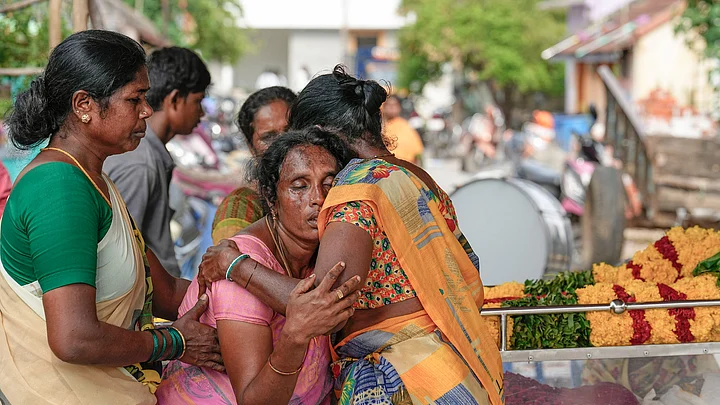The death of 65 persons following the consumption of illicit liquor in Tamil Nadu’s Kallakurichi district last month has dented the image of the MK Stalin-led DMK government, which has been celebrating its superlative performance in the 2024 Lok Sabha elections.
The tragedy in the Karunapuram village in Kallakurichi, caused by the consumption of methanol-infused spurious liquor, is among the worst such hooch disasters recorded in the state in over two decades.
In a state where the sale of alcohol through Tamil Nadu State Marketing Corporation (TASMAC) generates huge revenues for the government (approximately Rs 45,000 crore in 2023-24), the sight of people consuming illicit liquor – or 'packet arrack' as it is locally called – has not been uncommon.
With the increase in liquor prices at TASMAC outlets, the appeal of cheap, locally brewed illicit arrack dispensed in polythene sachets has become difficult to rein in.
The Persistent Problem of Illicit Liquor
This is the second such tragedy in the last two years in the state. In May 2023, 22 people died and 45 were hospitalised near Viluppuram's Marakkanam area after consuming toxic alcohol. Ironically, the incident had taken place after the government had informed the state Assembly that there had been “no hooch tragedies in the state” in the last 14 years due to its “zero tolerance” policy.
The action to curb illicit liquor brewers has been sporadic, and it is an open secret that in many villages across the district, illicit liquor flows freely.
The arrack is not too difficult to distil locally as the ingredients are available nearby. The problem arises when poisonous methanol is added to the arrack. Methanol is a controlled substance in the state but is easily available as bootleggers source it from industries.
Though the state government had then promised to launch a crackdown on illicit liquor, it appears that very little has been done.
The tragedy has exposed a lethal nexus between bootleggers, local police and politicians, the evidence of which is damning. Dozens of people from the village came on video and said that though they had repeatedly complained regarding the sale of illicit liquor to the local police, nothing had been done.
Acting swiftly after the incident, the DMK government shunted out the District Collector, and suspended the District Superintendent of Police (DSP), along with officials and personnel of the Prohibition Enforcement Wing (PEW). It also transferred out the Additional Director General of Police (Enforcement) who was in charge of the PEW across the entire state.
Prior to the 2023 incident, the last major tragedy took place in 2001, when 148 people died after consuming illicit liquor near Panruti in Cuddalore district. After the rise in the spate of such incidents, the then AIADMK government had introduced 100 ml liquor at Rs 15 to wean people away from illicit liquor. Maybe it is time for the DMK government to consider such a move again.
Kallakurichi Tragedy a Black Mark in DMK Govt's Tenure
The DMK government has been plagued by charges of being soft on the illicit liquor mafia. Worse, there have been accusations that some of its lower-level functionaries may be hand in glove with the bootleggers.
It's been two weeks since the incident took place – and Chief Minister Stalin is yet to visit Kallakurichi to meet the families of the deceased. The reason for his reluctance is hard to fathom, especially as most political leaders in the state have already visited the district.
Meanwhile, the state government's announcement to provide a solatium of Rs 10 lakh to the kin of the victims has resulted in an even bigger controversy. In 2023 too, the DMK government had drawn flak for giving a large compensation to the families of victims in Marakkanam.
Opposition parties, including the AIADMK, were quick to pin the government down, asking why such a large amount should be sanctioned to those who had violated the law and consumed illicit liquor. This amount, they pointed out, was much higher than the solatium given to victims of accidents and natural disasters in the state.
Though the DMK government promised to prohibit liquor in Tamil Nadu during the 2016 Assembly elections, it was quietly buried after they lost the polls.
With calls for prohibition arising again, the Stalin-led government finds itself in a quandary, as it knows full well that it has neither the resources nor the will to implement prohibition – and such a move could only convert the present stream of illicit liquor in the state into a flood.
DMK functionaries are also the biggest beneficiaries in supplying liquor to TASMAC and any move towards prohibition will hurt them badly. There is also the issue of loss of substantial revenue to the state exchequer that needs to be factored in if the government does consider placing a ban.
With the long list of freebies being given, the loss of a sizeable chunk of revenue will have its own implications. Safe to say that imposition of prohibition is very unlikely anytime soon.
At a time when the DMK should have been celebrating its electoral success, it finds itself under pressure. Though its alliance partners have been muted in their criticism, they too have had to take a stand fearing public outrage.
With the 2026 Assembly elections less than two years away, this tragedy has created sizeable anti-incumbency sentiment against the Stalin government. Stalin still has plenty of time to turn things around, but the Kallakurichi incident will remain a black mark on his tenure as the chief minister of the state.
(Sumanth C Raman is a television anchor and political analyst. He tweets @sumanthraman. This is an opinion piece and the views expressed are the author's own. The Quint neither endorses nor is responsible for them.)
(At The Quint, we question everything. Play an active role in shaping our journalism by becoming a member today.)
